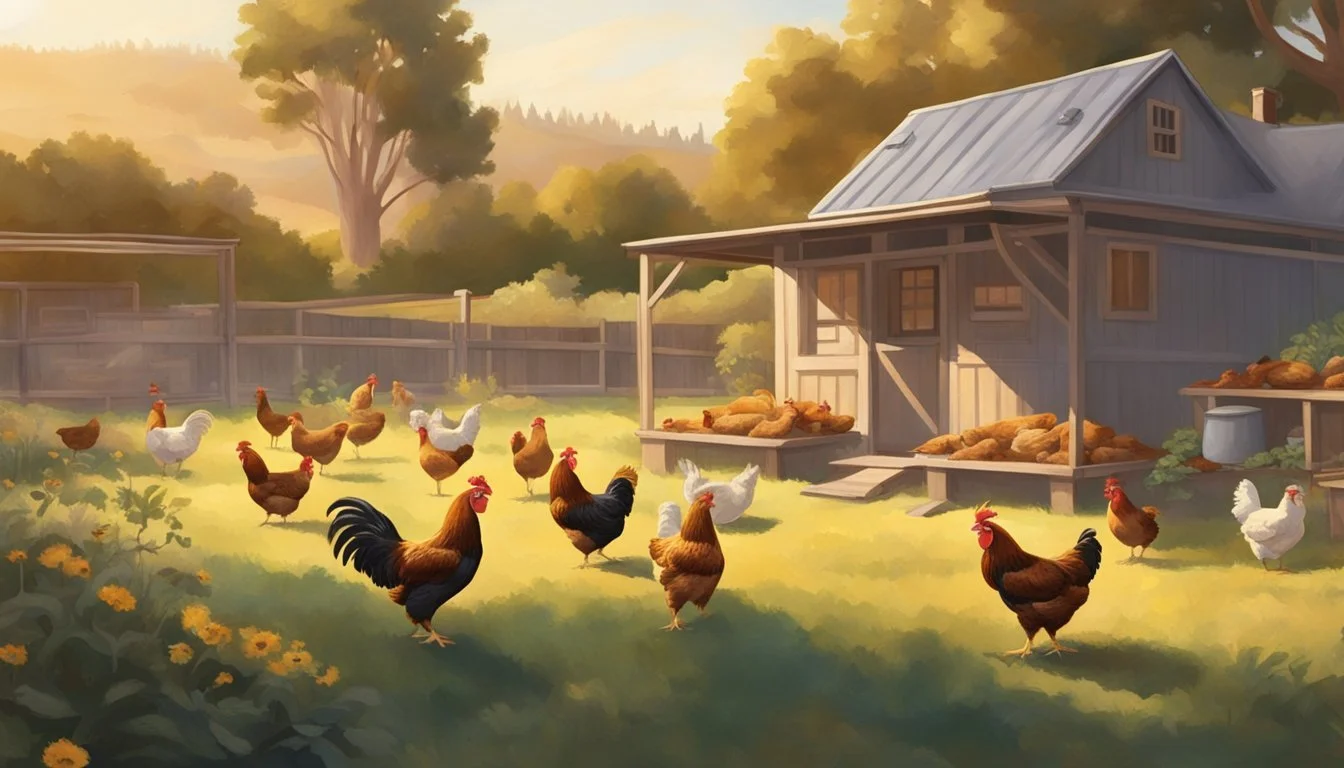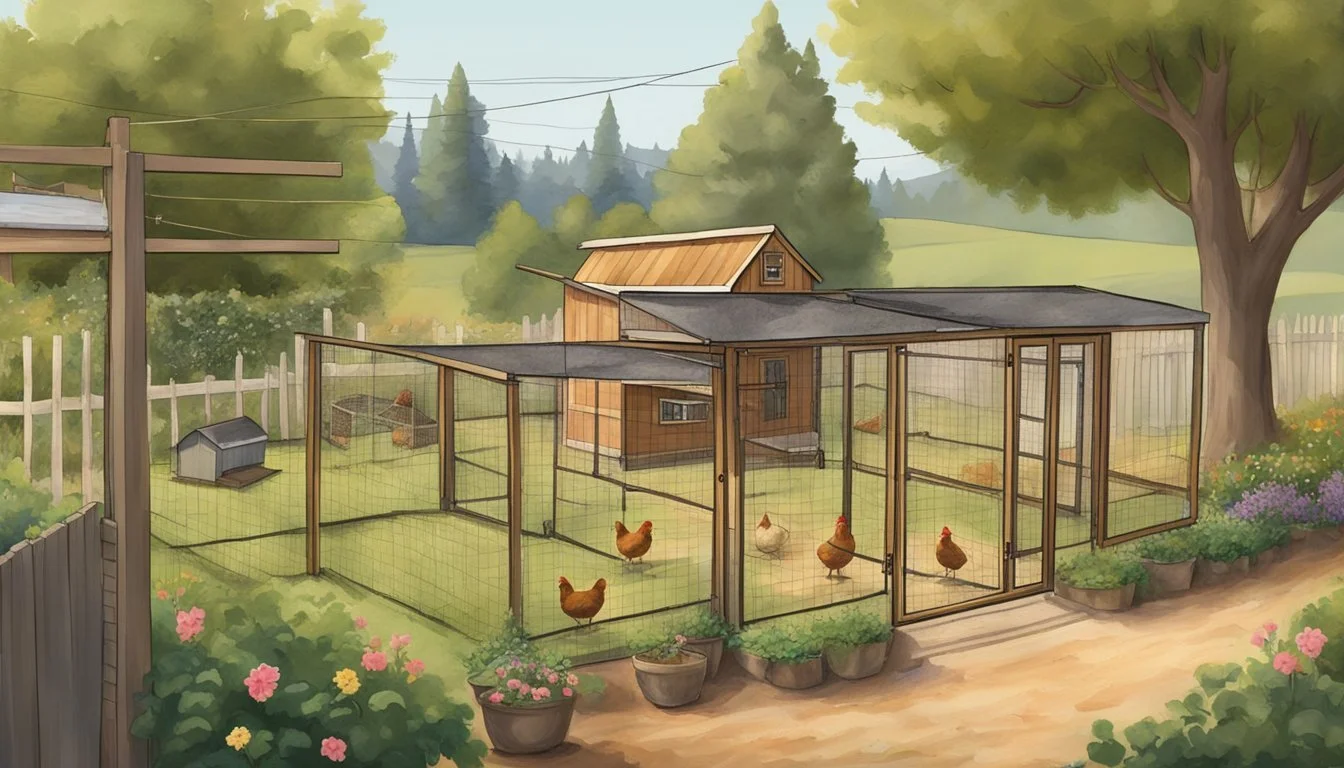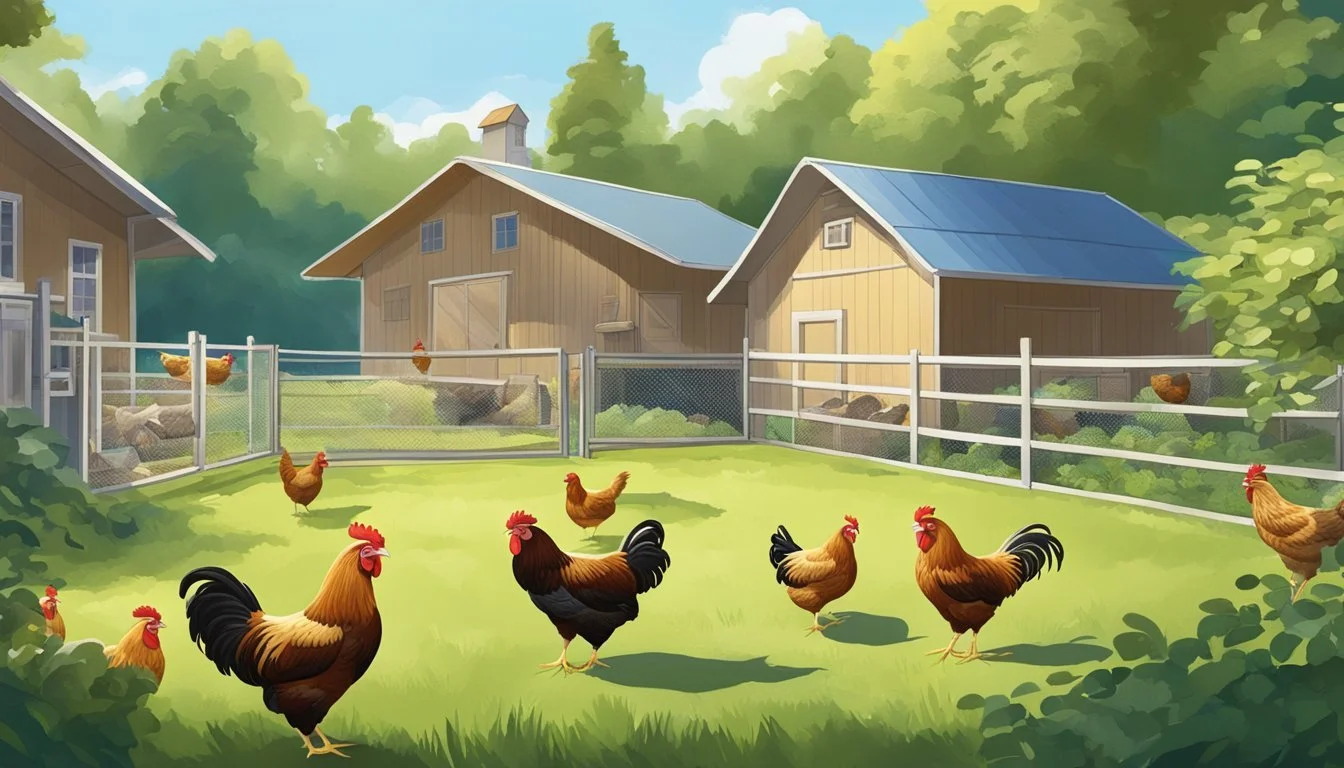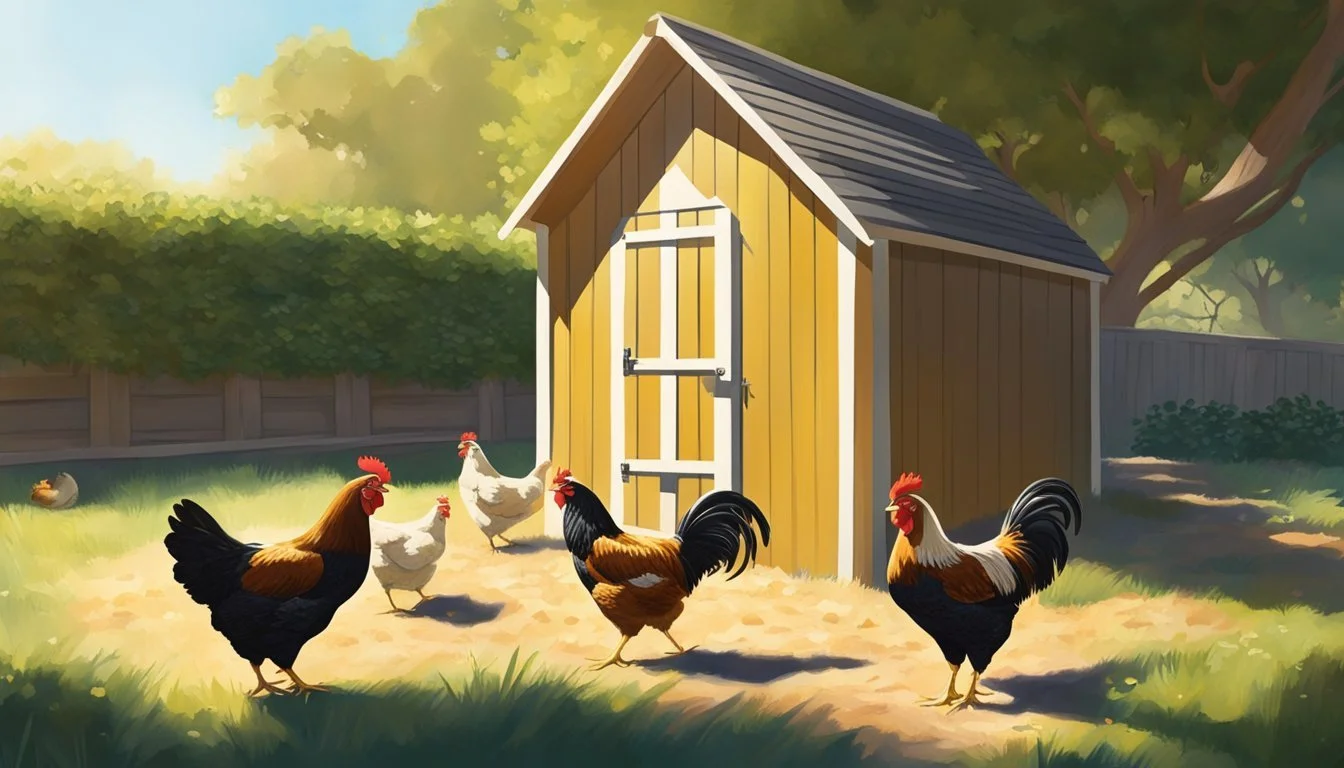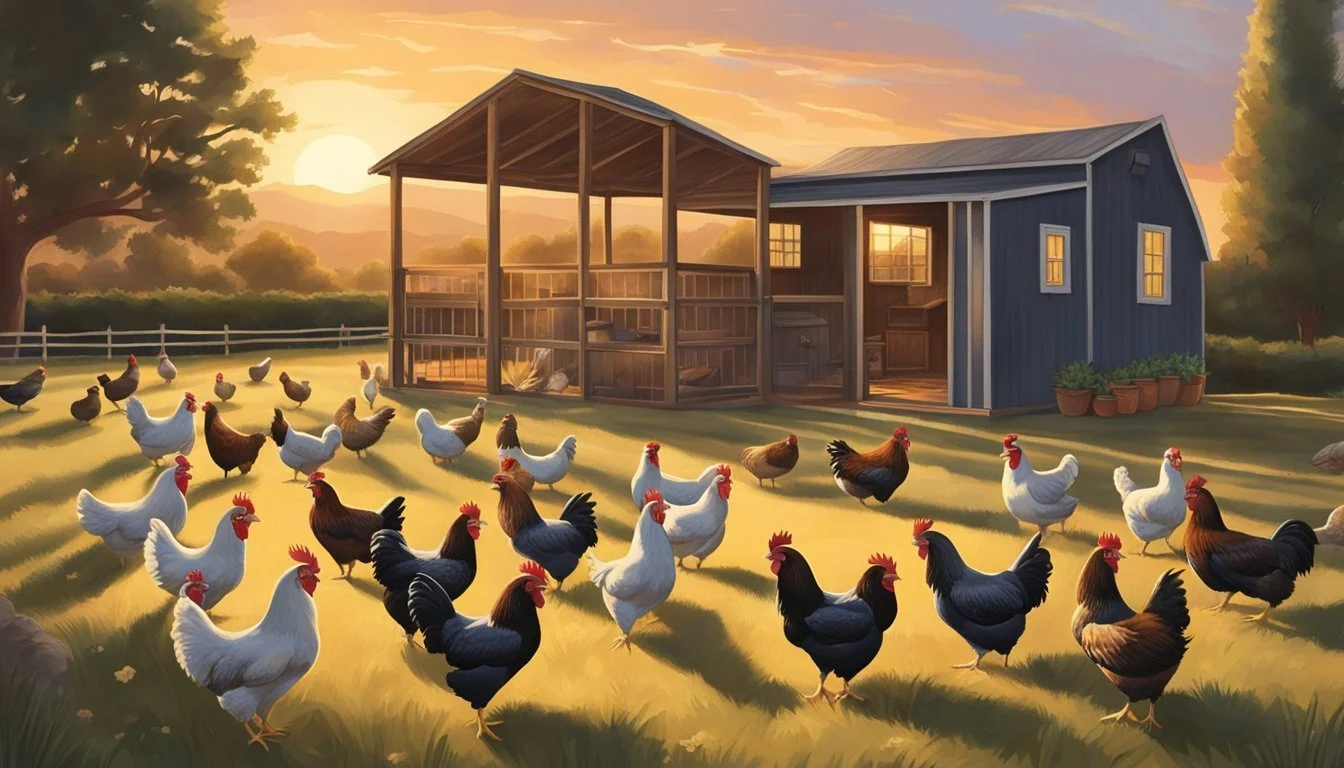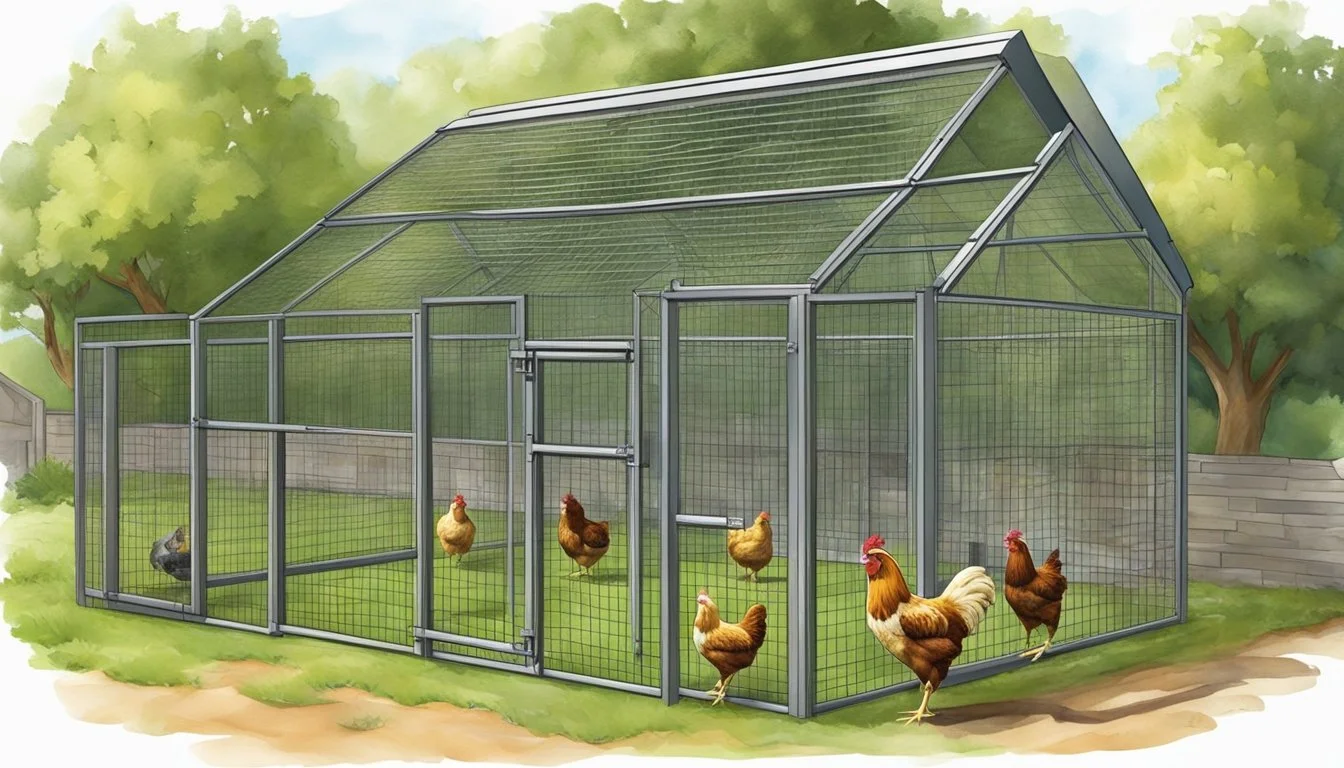Raising Backyard Chickens in Napa, CA
Essential Tips for Beginners
Raising backyard chickens has become a popular practice among residents in Napa, CA, where the temperate climate and rich agricultural heritage provide an ideal setting for small-scale poultry farming. The city's regulations are supportive of this pastime, allowing homeowners to keep chickens within certain guidelines to ensure that the activities are in harmony with the community and local environment.
In Napa, it is important for residents to be mindful of the city's ordinance which specifies that raising roosters, geese, peacocks, and guinea hens over the age of baby chicks or goslings is prohibited, ensuring peace and order in residential areas. Small-scale chicken enthusiasts in Napa find that keeping chickens offers not just the benefit of fresh eggs but also the joy of watching their hens interact and forage, which can be a relaxing and educational experience for the whole family.
Local organizations and resources such as Napa Backyard Chickens provide valuable insight into the breeds that thrive in the region, care techniques, and how to maintain a clean and healthy environment for the chickens. These entities highlight the importance of community, expertise, and support in successful backyard chicken raising, emphasizing that such practices are not only about sustainability but also about enriching the lives of Napa residents through connecting with nature and fostering a sense of self-sufficiency.
Understanding Local Chicken Laws in Napa
Local regulations in Napa, California, are specific about how residents can raise backyard chickens. Understanding these laws is crucial for any potential chicken owner in the area.
Navigating Zoning and Ordinances
In Napa, zoning regulations dictate where chickens may be kept and how many are permitted. Local ordinances must be reviewed to ensure compliance. For example, Napa's municipal code prohibits the raising of certain fowl, including roosters and geese, within city limits. Residents should check with Napa's Code Enforcement or local planning department to learn about the zoning laws applicable to their specific neighborhood.
Contact for Napa Code Enforcement:
Phone: 707-257-9530
Finding Information on Rare Breeds Legislation
While general chicken ordinances are accessible, information on rare breeds and their legislation may not be as straightforward. Napa's ordinances do not specifically address rare breeds; however, enthusiasts should inquire with local authorities to confirm any exceptional rules or permits that might apply.
Chicken Ordinance Compliance
To comply with Napa's chicken ordinance, owners must ensure no live roosters, geese, peacocks, or guinea hens are kept after they have matured from baby chicks or goslings. Compliance also means adhering to regulations regarding coop construction, placement, and maintenance. It’s important to maintain a clean and safe environment for both the chickens and the community.
Key Areas for Compliance:
No mature prohibited fowl
Coop construction and location
Sanitary maintenance
Individuals looking to raise chickens in Napa should always consult the most current local laws to remain compliant.
Getting Started with Backyard Chickens
Raising chickens in Napa, CA, requires understanding the locality's specific regulations, choosing the right breeds, and setting up a suitable habitat for the flock. This section equips potential chicken keepers with the foundational knowledge needed to embark on their poultry-keeping journey.
Choosing the Right Chicken Breeds
In Napa, one must select chicken breeds that can thrive in the local climate and adhere to city ordinances. For instance, Napa's laws prohibit the keeping of roosters and certain types of fowl to reduce noise and nuisance. One should consider starting with rare breeds that are known for being good layers and have a calm temperament suitable for suburban backyards. Colored egg layers are a favorite among locals, offering not only utility but also aesthetic pleasure.
Setting Up Your Chicken Coop
A secure and comfortable chicken coop is crucial for the health and productivity of backyard chickens. The coop must protect the chickens from predators and provide shelter from the elements. Essential features include:
Ventilation: Ensure adequate airflow to maintain a healthy environment.
Nesting Boxes: Allocate at least one box per four hens for egg-laying.
Space: Provide a minimum of 2-3 square feet inside the coop and 8-10 square feet in the outdoor run per chicken.
Essential Supplies for Raising Chickens
To raise backyard chickens, one needs to acquire several key supplies:
Chicken Feeders and Waterers: These should be clean, easily accessible, and filled regularly to ensure chickens are well-fed and hydrated.
Chicken Feed: Opt for high-quality feed that meets nutritional requirements, considering feed designed for the specific ages and production statuses of the chickens.
Bedding Material: Pine shavings or straw can be used to keep the coop clean and comfortable.
By focusing on these initial steps and adhering to best practices, individuals can successfully raise healthy and productive backyard chickens in Napa, CA.
Chicken Development Stages
Understanding the stages of chicken development helps owners provide the necessary care at each step, ensuring healthy growth from hatching eggs to adult layers capable of producing fresh eggs.
Incubation and Hatching Eggs
The process begins with incubation, a critical stage where fertilized chicken eggs are kept at a stable temperature and humidity until hatching. The ideal temperature is consistently around 99.5°F with a relative humidity of 50-65%. Eggs should be turned several times a day to prevent the embryo from sticking to the shell. Around day 21, the chick begins the hatching process, known as pipping, where they break through the eggshell.
Day 1-3: Embryos develop eyes, heart, and blood vessels.
Day 4-7: Major organs start forming; the tail appears.
Day 8-14: Feathers begin to appear; the beak and bones harden.
Day 15-21: Chick grows to fill most of the egg space and takes the pipping position.
Caring for Chicks
Once hatched, baby chicks require a warm environment, known as a brooder, with a heat source to maintain their body temperature. Start with a temperature of 95°F and decrease it by 5°F weekly until they are acclimated to the outdoor temperature. Chicks should have access to chick starter feed, which is high in protein to support their rapid growth, and clean water.
First week: Maintain temperature and introduce 18% protein starter feed.
Weeks 2-4: Gradually decrease heat; monitor growth and health.
Raising Pullets to Layers
Pullets, young hens that have not yet started laying eggs, require attention to nutrition as they mature. Transition from starter feed to grower feed at 6-8 weeks, which has less protein but essential vitamins and minerals for ongoing development. Provide ample space as they grow to prevent stress and encourage exercise. Expect the onset of laying at around 18-22 weeks when pullets become layers, capable of producing fresh eggs. A layer feed, higher in calcium, should be provided to support strong eggshell production.
Weeks 6-18: Transition to grower feed; monitor space requirements.
Weeks 19+: Introduce layer feed; look for signs of first eggs.
Daily Care and Maintenance
When raising backyard chickens in Napa, California, daily care is paramount for the health and productivity of the poultry. Attention to feeding habits and health monitoring is essential for the chickens’ well-being, combining adequate nutrition with ongoing assessments to ensure a healthy flock.
Feeding and Nutrition
Feeding Schedule:
Morning: Chickens should have access to their feed first thing in the morning.
Evening: Check feed levels and refill if necessary before dusk.
Types of Chicken Feed:
Starter: For chicks up to 6 weeks old.
Grower: From 6 weeks to laying age (about 20 weeks).
Layer: For hens that have begun laying eggs.
Supply a consistent amount of high-quality feed formulated for the chickens' specific life stages.
Offer fresh, clean water daily, as chickens consume approximately three times as much water as feed.
Incorporate grains and greens to provide variety and enrichment.
Health Monitoring and Upgrades
Regular Health Checks:
Observe behavior for signs of distress or illness.
Examine feathers, eyes, and beaks for abnormalities.
Coop Upgrades:
To maintain chicken health and productivity:
Ventilation: Adequate airflow to reduce humidity and ammonia levels.
Security: Robust locks and barriers to protect against predators.
Cleanliness: Periodic cleaning of the coop to prevent parasite infestation and disease spread.
Providing chickens with their needs ensures a thriving environment in Napa's backyard settings, sustaining the flock for years to come.
Social Dynamics and Flock Management
In managing a backyard chicken flock in Napa, CA, understanding social hierarchy and rooster behavior is crucial for a harmonious environment.
Integrating New Members
When introducing new chickens into an established flock, there is an inevitable shake-up in the social order. It is recommended to:
Quarantine new birds for at least 30 days to prevent the spread of diseases to the existing flock.
Observe the birds during a short supervised visit in a neutral space to gauge initial interactions.
Create a separate but adjacent space for new chickens to allow visibility and close proximity without direct contact.
Monitor interactions closely over several weeks, stepping in to mediate if aggressive behavior escalates.
Understanding Rooster Behavior
The presence of roosters affects the flock dynamics significantly. Roosters serve as protectors and have their own behavioral patterns:
Territorial Nature: Roosters can be quite territorial, supervising and defending their space vigorously against perceived threats.
Pecking Order: They often sit atop the pecking order, influencing flock behavior and dynamics.
In Napa, CA, city regulations prohibit the keeping of roosters, geese, peacocks, or guinea hens older than the chick stage. However, for those legally keeping roosters, it is important to provide adequate space to minimize aggressive behavior. Additionally, understanding and properly managing roosters can contribute to a more stable and productive flock.
Coop Security and Safety
When raising backyard chickens in Napa, CA, coop security and safety are paramount to protect your flock from predators and ensure the durability of their living space. Proper maintenance and timely upgrades of the chicken coop and chicken run can prevent unforeseen issues and create a safe environment for your chickens.
Protecting Against Predators
Nesting Boxes and Coop: Ensure that the nesting boxes within the coop are secure from predators. Boxes should be elevated and have a latch that is not easily manipulated by raccoons or other common threats.
Chicken Run Security: A chicken run needs sturdy fencing, and it's advised to bury the fencing at least 12 inches underground to deter digging predators. Overhead netting can protect chickens from birds of prey.
Materials to Use:
Use hardware cloth instead of chicken wire, as it's more durable and predator-proof.
Fit sturdy locks or latches that require human dexterity to open, thereby keeping smarter predators like raccoons at bay.
Maintaining and Upgrading Coops
Regular Maintenance: Inspect and repair any damage to the coop regularly. Look for signs of wear, potential weak spots, or places where predators could gain entry.
Upgrades for Safety: Consider adding locks that require keys or combinations, as these provide an additional layer of security. Ensure that the structure is solid, with no loose or rotting panels.
Ventilation:
Install vents or windows that can be securely closed to provide sufficient airflow while keeping chickens safe.
Replace or repair any damaged screens or openings that could allow predator access.
Coop Cleanliness: A clean coop not only keeps chickens healthy but also reduces the risk of attracting pests or predators that might be drawn to food waste or droppings. Invest in a coop with easy-to-clean surfaces and implement a routine cleaning schedule.
Engaging with the Chicken-Keeping Community
Connecting with the local chicken-keeping community in Napa, CA can enhance the experience of raising backyard chickens through shared resources, experiences, and opportunities for trade.
Local Markets and Trade
In Napa, community members often gather at local markets where they can trade not just goods but also knowledge. Farmers' markets are prime spots for chicken keepers to:
Sell: Excess eggs and homemade chicken-related products.
Trade: Supplies like feeders, waterers, or even breeds of chickens.
Learn: Best practices from more experienced chicken owners.
Participating in these markets can also lead to connections with local feed stores, which often serve as hubs of the chicken-keeping community.
Online Forums and Support
The digital age provides ample support through online forums and social media pages like the Napa Chicken Keepers Facebook page. Here, individuals can:
Ask for advice: On care, coop building, and dealing with predators.
Arrange meet-ups: To exchange tips and supplies.
Stay Updated: With local regulations and community events.
Napa Chicken Keepers on Facebook fosters a tight-knit community where members respond to queries and share news, making it a robust support system for both novice and seasoned poultry enthusiasts.
Final Thoughts
A well-cared-for backyard flock can be a rewarding addition to any home in Napa Valley. They offer a sustainable source of fresh eggs, an opportunity for educational projects, and even pest control for the garden. However, potential poultry keepers must consider both the benefits and responsibilities that come with raising chickens.
Space: Adequate space is essential for chickens to roam, forage, and express natural behaviors. Shelter, security, and room to expand should they decide to grow their flock are all important.
Care: Chickens require daily attention to their needs, including feed, water, and protection from predators.
Health: Regular vet checkups ensure the flock remains healthy and any issues are addressed promptly.
Legality: Prospective owners should verify local regulations to ensure compliance with zoning and care standards.
It's imperative to approach the raising of chickens with attention to detail and a commitment to their wellbeing. Those who do embark on this journey often find it immensely gratifying. The community around Napa Valley is supportive and shares a collective wealth of knowledge, often spearheaded by groups such as Napa Backyard Chickens. They can offer vital resources to both novices and experienced chicken enthusiasts alike.
For anyone considering their own backyard flock in Napa, they should begin with thorough research, leverage local expertise, and maintain a commitment to responsible stewardship of their feathered charges. With the right approach, the integration of chickens into one’s backyard can be a delightful experience.

